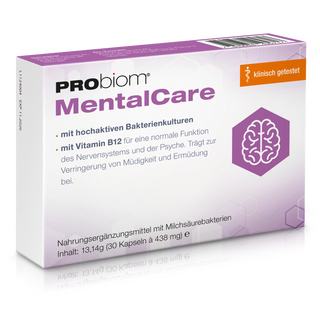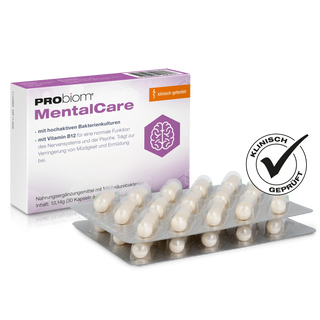The desire to detoxify one's body is widespread. Whether after the holidays, during stressful periods, or in cases of chronic illness, many people turn to detox regimens to feel energized and healthy again. But what does detoxification actually mean? And how beneficial is it really to "cleanse" the body?
The fact is: Our body has powerful detoxification systems. The liver, kidneys, intestines, lungs, and skin work daily to eliminate toxins. However, this process can become unbalanced due to an unhealthy lifestyle, environmental toxins, and chronic stress. This is where a conscious detox strategy comes in. What's particularly interesting is that the microbiome, the community of billions of bacteria in the gut, plays a central role in detoxification, immune function, and metabolism.
In this article, you'll learn how you can support your body with natural remedies, nurture your microbiome, and thus find greater vitality and well-being. We'll explore background information, myths, proven methods, and scientific findings – for a holistic detox approach that works sustainably.
What does “detoxifying the body” actually mean?
"Detox" or "detoxification" is not a medically clearly defined term, but it is frequently used in naturopathy and preventative health care. It refers to supporting the body's own processes responsible for the breakdown and elimination of harmful substances. These can be environmental toxins, residues from medications, alcohol, nicotine, or even metabolic waste products.
A holistic detox approach therefore does not mean carrying out radical short-term fasting cures, but rather specifically strengthening the systems responsible for detoxification.
The most important detoxification organs at a glance
liver
The liver is the body's central detoxification organ. It filters toxins from the blood, converts them into water-soluble substances, and sends them for excretion via the kidneys or intestines. Alcohol, sugar, and medications place a particularly heavy burden on the liver.
kidneys
The kidneys filter approximately 180 liters of blood daily and excrete water-soluble toxins through urine. Adequate fluid intake is essential for their proper function.
Colon
A healthy gut not only ensures digestion but also plays a key role in the elimination of toxins. If the intestinal flora is out of balance, "reintoxication" can occur.
skin
Toxins are also released through sweat and skin secretions. Sauna sessions and exercise promote this process.
lung
The lungs excrete volatile substances such as CO₂ and pollutants from the air we breathe. Fresh air, breathing exercises, and not smoking promote lung function.
Nutrition as a basis for detoxification
An alkaline-rich, plant-based diet supports the liver and intestines in detoxification. Foods that are particularly beneficial:
-
Green leafy vegetables (e.g. spinach, kale, parsley)
-
Cruciferous vegetables (broccoli, cauliflower, arugula)
-
Garlic and onions (sulfur-containing, detoxifying)
-
Flaxseeds and chia seeds (high in fiber, intestinal cleansing)
-
Turmeric, ginger and lemon water (antioxidant and anti-inflammatory)
Sugar, alcohol, highly processed products and additives should be reduced as they place additional strain on the liver and negatively affect the microbiome.
Importance of the microbiome in detoxification
The gut microbiome consists of trillions of microorganisms that are closely linked to our immune system, metabolism, and detoxification. A balanced microbiome not only aids nutrient absorption but also produces short-chain fatty acids and other metabolites that regulate inflammation and protect the intestinal mucosa.
A disrupted microbiome , on the other hand, can lead to the so-called "leaky gut" problem, in which toxins more easily enter the bloodstream and place greater strain on the liver. Therefore, maintaining the microbiome is an essential pillar of any detox strategy.
Strengthen your microbiome – here's how:
-
Prebiotics (e.g. inulin from chicory, onions, Jerusalem artichoke)
-
Fermented foods (sauerkraut, kimchi, kefir)
-
High-fiber diet (whole grains, vegetables, legumes)
-
Avoiding antibiotics and chemical additives
Detox through exercise and breathing
Physical activity promotes blood circulation, activates the lymphatic system, and supports the liver and kidneys in detoxification. Exercise also increases oxygen uptake—important for all metabolic processes.
Recommended activities:
-
Walks in the fresh air
-
Yoga and gentle stretching exercises
-
Sweating due to endurance sports or sauna sessions
-
Breathing exercises and meditation to reduce stress hormones
Detox and stress: The hormonal component
Chronic stress negatively impacts all detoxification systems. The stress hormone cortisol stimulates inflammatory processes, inhibits liver function, and disrupts the microbiome.
Relaxation techniques such as progressive muscle relaxation, meditation or simply taking conscious breaks in everyday life promote regeneration and strengthen the body's detoxification capacities.
Probiotics as support
Probiotics – live microorganisms – can help restore the microbiome to balance. They support the intestinal mucosa, regulate the immune system, and promote the production of anti-inflammatory substances. They thus indirectly contribute to the more efficient binding and elimination of toxins. Regular intake through supplements or fermented foods can be part of a long-term detoxification strategy.
Detox myths in the fact check
Many products advertise detox effects that are scientifically unsupported. Here's a brief assessment:
-
Detox teas: Can have a diuretic effect, but are of limited help in true detoxification.
-
Fasting cures: Can have a relieving effect, but should be supervised by a doctor.
-
Detox patches: No scientific evidence of effectiveness.
-
“Detox diets” without solid food: possible in the short term, problematic for the metabolism in the long term.
Conclusion: Detox as a lifestyle instead of a short-term cure
Detoxifying the body doesn't mean torturing yourself for days or weeks, but rather consciously and long-term establishing lifestyle habits that strengthen our detoxification organs. A gut-friendly diet, exercise, stress reduction, and sufficient sleep are the central pillars of a sustainable detox approach.
Nurturing your microbiome automatically supports your body's detoxification capacity. Because health begins in the gut – and a healthy gut is the foundation for energy, immune strength, and inner balance.

















